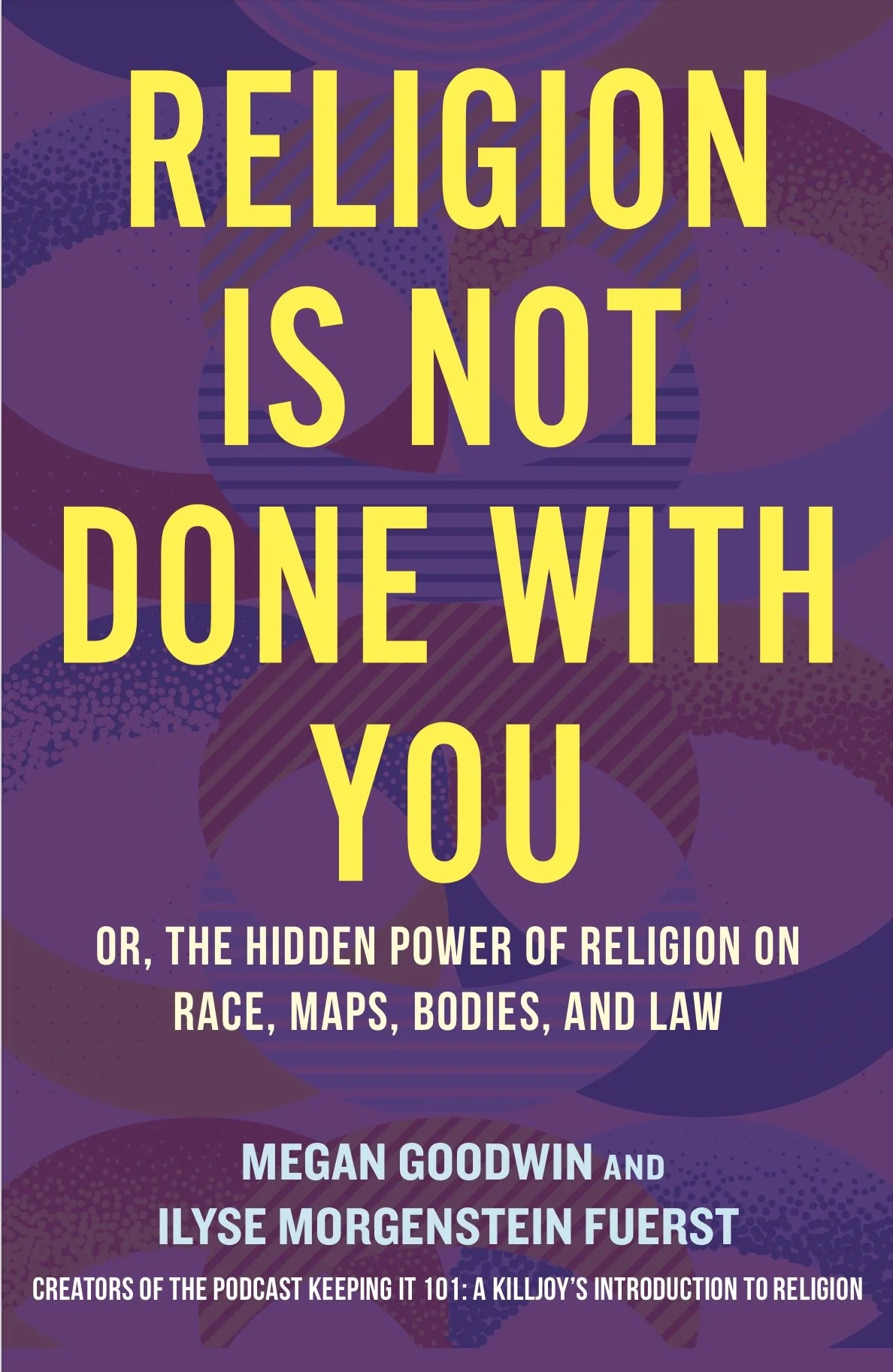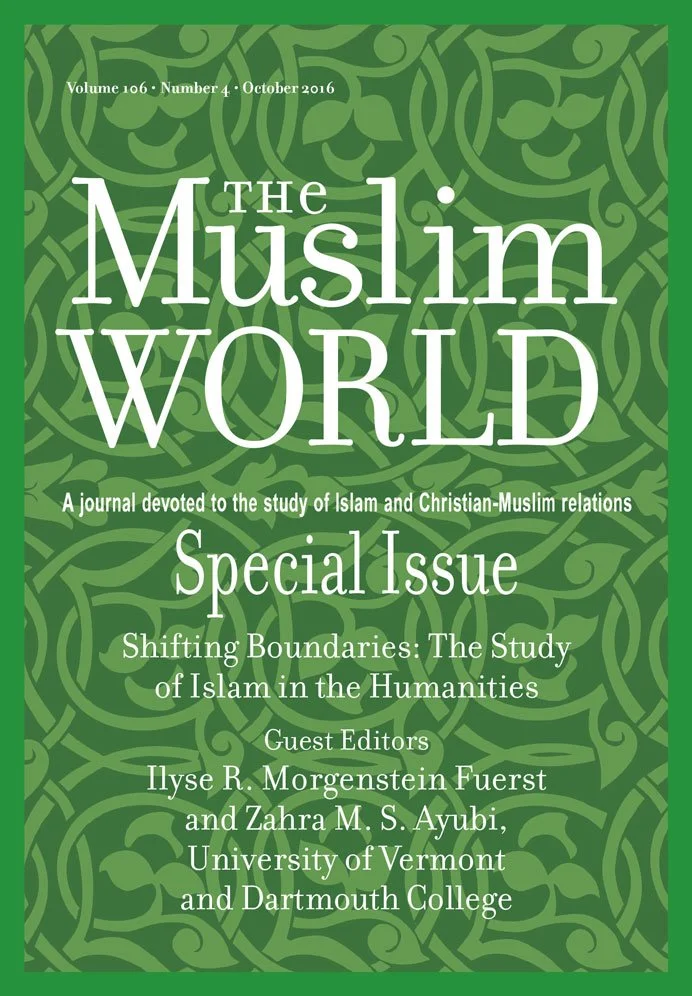Books
Religion lurks in the floorboards of our daily lives, whether we want it to or not. A departure from more traditional approaches to “Religion 101,” Religion Is Not Done with You gives thought-provoking context to the basics of religious studies by challenging readers to consider the origins of their assumptions about religion and broaden their perspectives on what religion is and does.
Religion scholars and Keeping It 101 podcast duo Ilyse Morgenstein Fuerst and Megan Goodwin offer their straightforward, plainspoken overviews of religious studies theory: that religion is what people do (not just beliefs or individual practices); that people are complicated and messy and constantly changing, which means religion is also complicated and messy and constantly changing; that religion shapes what choices you get to make. Choices like what you can learn in school; how your government works; what kind of options you have (or increasingly don’t have) in caring for your own body.
Sure, you have the choice to participate in religion or not. But how you make that choice builds on your entire personal history, your connection to communities and regions, and the systems that surround you. All of which have been shaped by religion.
Religion is systems and structures and assumptions we didn’t create or choose—and, to be honest, we might not even like or agree with. You can feel however you want to feel about religion, but religion is shaping your world whether you like it or not. And if you don’t like how religion is shaping our world? This book might just be your first step in diagnosing the problems and agitating for positive change. Even if you are done with religion, religion is not done with you.
Indian Muslim Minorities and the 1857 Rebellion: Religion, Rebels, and Jihad (2017) addresses minoritization and racialization of Muslims before and after the Rebellion.
While jihad has been the subject of countless studies in the wake of recent terrorist attacks, scholarship on the topic has so far paid little attention to South Asian Islam and, more specifically, its place in South Asian history. Seeking to fill some gaps in the historiography, the book examines the effects of the 1857 Rebellion on debates about the issue of jihad during the British Raj. It shows that the Rebellion had lasting, pronounced effects on the understanding by their Indian subjects (whether Muslim, Hindu or Sikh) of imperial rule by distant outsiders. For India's Muslims their interpretation of the Rebellion as jihad shaped subsequent discourses, definitions and codifications of Islam in the region. Finally, Indian Muslim Minorites argues that perceptions of jihad, contextualised within the framework of the 19th century Rebellion, continue to influence contemporary rhetoric about Islam and Muslims in the Indian subcontinent.
Bloomsbury | IndieBound | Amazon
MORE ABOUT INDIAN MUSLIM MINORITIES
Reading Religion review · Reading Religion interview · Maydan review ·
New Books Network interview
Words of Experience: Translating Islam with Carl W. Ernst (2021) is a co-edited volume whose chapters reflect on the unmatched influence of Carl Ernst upon Islamic studies and what the future the field of Islamic studies may hold.
Carl W. Ernst devoted his academic life to translating Islam, linguistically and culturally, typically within the intellectual context of Religious Studies. His work has focused on how Islamic concepts have travelled across time and space, and his influence on Islamic Studies and Religious Studies is far-reaching. This volume features contributions from long-standing colleagues, scholars whose own work has built on Ernst’s contributions, and former students. It looks at themes in Islamic Studies that Ernst has addressed and expands on his major contributions.
Essays in this volume touch nearly every major element in Islamic Studies – from the Qur’an to Sufism, Islamophobia to South Asian Islam, historical and contemporary praxis, music and more. This collection demonstrates one core tenet of Ernst’s work, specifically the argument that Islam is not rooted in one place, time or language, but is a vast network, routed through myriad places, times and languages.
In addition to serving as the co-editor, I have an essay in this volume titled “Writing, Doing and Performing the Future of Islamic Studies: The Practical Example of Carl W. Ernst.” It addresses landscapes in which scholars of Islam, often located in humanistic disciplines, conduct their research; then, it addresses how scholars of Islam have navigated their various publics in increasingly politicized settings; finally and as above, by using Ernst as a model, it suggests practical strategies for scholarly work as we look toward the future of Islamic studies.
Equinox | IndieBound | Amazon
MORE ABOUT WORDS OF EXPERIENCE
New Books Network Podcast interview · Journal of Sufi Studies review
Reading Religion review
Morgenstein Fuerst, Ilyse R. and Zahra M. S. Ayubi. Shifting Boundaries: The Study of Islam in the Humanities, special edition of The Muslim World, Volume 106, Number 4 (October 2016).
Zahra M. S. Ayubi and I co-edited this book-length special edition volume of The Muslim World, which drew upon our co-organized conference of the same name. From the article:
“This special issue attends to these broad questions by highlighting scholarly research which expressly interrogates the spaces in which theory, method, and the study of Islam meet; pedagogies and trends in contemporary classrooms and departments; and the question of what Islamic studies might (and might not) be. The conference from which this edition draws—like the anecdotes above—moved between and among the experiences of scholars as researchers, colleagues, campus members, teachers, and public intellectuals. This is a purposeful location of the scholar in her scholarly contexts in its broadest conceptualization: the study of Islam in the humanities is undoubtedly affected by the shifting boundaries of what scholars do, where scholars work, how scholars publish, and what topics, geographies, and histories contour the study of Islam. It is simultaneously a purposeful location of scholarship about Islam and Muslims within broader categorizations of such scholarship into the field of Islamic studies within the broader study of religion.”
Books in Process
My next academic monograph is Imperial Pandemics: Racializing Religion Globally. In it, I argue that failing to account for colonial modernity’s ongoing role in shaping our understandings of religions as racialized means we fundamentally misunderstand—and cannot properly address—racialized hate like Islamophobia or antisemitism. My work uniquely weaves together theories of imperialism, critical race, and internal colonialism to offer a global framework for understanding not just anti-Muslim hostility, but racialized religion generally. In short, this project is about race, religion, identity, belonging, and how global patterns of empire influence these ideas in disparate locations. This project is supported in part by a 2022-2023 Fulbright U.S. Scholar award.




